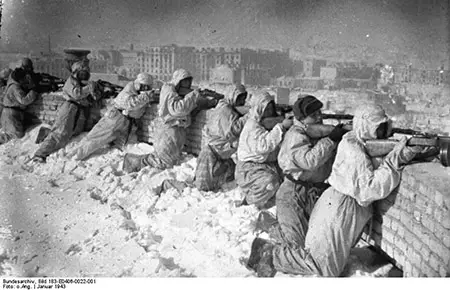Battle of Stalingrad
Russian Backstory
The Battle of Stalingrad took place from July 17th 1942 to February 2nd 1943. The Eastern front battle is considered by many to be the greatest defense by the Russians in World War II. Stalingrad is in Southern Russia was considered a very valuable position for Germany to takeover, which is the main reason why it was so important to defend. If the Germans were successful with the Battle of Stalingrad then they would be in perfect position to crush the southern part of Russia.
For Russia it was not only about defending the position, but the city was a major industrial boon to the nation and of specific symbolic importance politically. Stalingrad is the only city to have the name of the then Soviet dictator, Joseph Stalin. With Russia’s Marshal Georgii K. Zhukov setting the defensive and counterattack plans in motion, Russia was never at a major disadvantage.


German Backstory
When Germany invaded Stalingrad, Adolf Hitler understood how important this battle would be for the continuation of their campaign. September 3 1942 would see German Sixth Army’s Friedrich Paulus arrive outside of Stalingrad, and being immediately met with force. Russia not only had their defenses ready, but maintained a steady stream of reinforcements. The main Russian defending force was led by the highly decorated general V. I. Chuikov, and needed all the men they could get.
The battle for the Germans was not easy, as they had to fight through every inch of the city and couldn’t relax for a second. Both sides fought through the open streets, near blown up houses, and even in factories. Stalingrad the city became Stalingrad the battleground, and no one knew the city better than the Russians. Around November is when the German army started to feel the heat of the battle, as both their supplies and men were running low.
Marshal Georgii K. Zhukov took this opportunity to surround and crush the remaining Germans, who were under orders to hold their ground. When the battle was won on February 2nd 1943, over 150,000 Germans had died in the battle, with 91,000 surrendering to defeat.

Why Was the Battle of Stalingrad Important?
Losing the Battle of Stalingrad humiliated Hitler and made Germany suffer a loss of support due to their inactions. It also caused dissention in the German ranks, as Hitler ordered his men to win at all costs. With General Friedrich Paulus surrendering even while outmanned, he disobeyed a direct order from his superior. This would lead to Hitler questioning his generals moving forward, and suffering a big hit to morale.
The win at Stalingrad would also allow Russia to take a successful offensive approach, a move that would have been impossible a few months into the war. Even to this day, the battle is one of the hardest fought in history.

Who Was Affected?
Hitler as a leader suffered a major setback with the loss, with his distrust of the men underneath him only compounding the problem. In truth Germany never had a good advantage against the fortified city and was fighting a losing battle. Tactically, the Battle of Stalingrad could have even been salvaged for the Germans if Hitler allowed a retreat. His reluctance to admit defeat led to a bigger loss than Germany could handle, and ultimately cost them the war.

Names to Remember
General Friedrich Paulus was born on September 23rd 1890 and served in the German military from 1910-1945. His Sixth Army was feared for their ferocity and his ability to rally his troops. When Paulus was captured during the Battle of Stalingrad, it was on the same day he was promoted to field marshal by Hitler. While being held prisoner, Paulus spoke out against Nazi Germany and even joined the National Committee for a Free Germany.

Important Facts
Here are some important things to remember about the Battle of Stalingrad.
• Germany lost over 750,000 men while the Soviet Army lost over 478,741 men
• Romania, Hungary, Italy and Croatia fought with Germany in the battle
• Stalingrad in modern times is now known as Volgograd

Conclusion
The biggest war in Russian history turned the tide of the battle and embarrassed one of the most powerful leaders in the world. Russia stood strong and protected its people and its resources from the incoming German attack.



